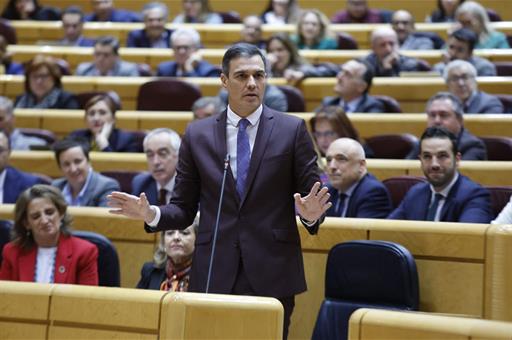Pedro Sánchez: "One of my main satisfactions as president is to see how coexistence and not confrontation prevails in Catalonia"
President's News - 2022.11.22
Upper House of Parliament, Madrid
The President of the Government of Spain, Pedro Sánchez, during the control session held today in the Upper House of Parliament, has insisted on his commitment to the roadmap set out for reconciliation and reunion with the Catalans. He did so in his answers to Alberto Núñez Feijóo, Member of Parliament of the Grupo Parlamentario Popular, and to Josep Lluís Cleries, spokesman of the Grupo Parlamentario Nacionalista, Josep Lluís Cleries, of Junts per Catalunya.
Sánchez stated that one of his main satisfactions as president is "to see how coexistence and not confrontation prevails in Catalonia", expressing his conviction that the majority of Spaniards and Catalans are in favour of harmony and do not want to return to the Catalonia and Spain of 2017.
The Executive has tried through dialogue and agreement, he said, to overcome the trauma that the Unilateral Declaration of Independence, which contravened the constitutional order, meant for Catalonia and Spain as a whole that year. "This government has taken very complex and courageous decisions, which have not been shared by the social majority of the country, and yet I would say that this social majority is aware that Catalonia and Spain are much better off in 2022 than in 2017," he said.
One of these decisions was the approval of pardon measures to allow those convicted in the trial for the "process" to leave prison. Another is the proposed reform of the crime of sedition in the Penal Code, which will bring Spain's legal system into line with that of the main European democracies: "We are talking about a crime that was drafted 200 years ago, whereas today we belong to a European project based on democracy, rights, freedoms and respect for political pluralism.
Sánchez warned, however, that the Constitution has sufficient instruments - such as article 155, which was already applied in 2017 - to defend the territorial integrity of the State vis-à-vis any possible new attack. "Let's hope that is does not come to this," he said.
Spain, a consolidated democracy
Regarding Spain's image in Europe, which Member of Parliament Cleries asked him about, Sánchez stated that it is that of a country in favour of energy market intervention to protect SMEs, industry and citizens from rising prices; that Spain was one of the first to demand a plan to deal with the COVID-19 pandemic - the translation of which was the European recovery funds; and that Spain stands firm in its convictions and constitutional and European principles of respect for the plurality and political diversity of its societies.
Pedro Sánchez said he was proud of Spain's democracy and assured that all the European Commission's reports on the member states of the European Union confirm the proper functioning of its rule of law.
The only "reproach", he said, is the blocking of the renewal of one of the constitutional bodies, the General Council of the Judiciary (CGPJ), in the last four years due to a lack of agreement with the main opposition party.
Transfers to the Autonomous Community of Navarre
The president reiterated that dialogue and agreement guide his government's actions with Catalonia, and that dialogue and agreement have likewise made it possible to resume negotiations on new transfers with the Autonomous Community of Navarre after 20 years at a standstill.
As explained to Member of Parliament Koldo Martínez Urionabarrenetxea, spokesman of the Izquierda Confederal Parliamentary Group for Geroa Bai, this negotiation has borne fruit with the approval of the transfer of prison health care in June 2021 - Navarre was the third autonomous community to receive it after Catalonia and the Basque Country - and the management, intervention, supervision and control of the Minimum Basic Income benefit last October.
The transfer of traffic competence is also scheduled to take place on 31 March 2023. According to Sánchez, the Guardia Civil officers who wish to remain in Navarre will be able to do so, and the transfer of traffic surveillance functions will be carried out in a coordinated manner.
"We are committed to the maximum development of the constitutional framework, the Statutes of Autonomy, and we will continue to fulfil our commitment to strengthen Navarre's self-government," the president concluded.
Non official translation





